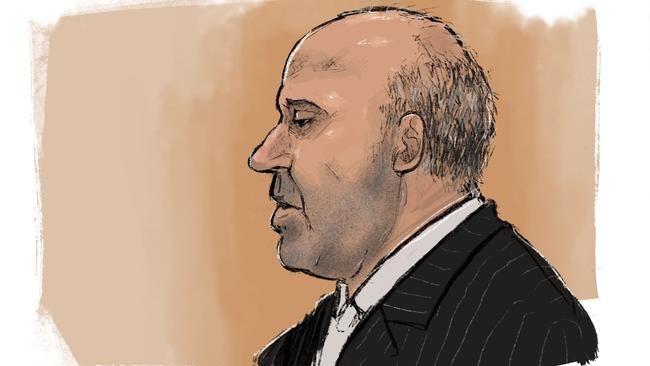Deadline: Security chief checkmates boss after Christmas party scandal
If you’re going to sack someone over bad behaviour at a Christmas party, you need to make sure your own record is squeaky clean — as one prominent Melbourne CEO recently learnt.

Police & Courts
Don't miss out on the headlines from Police & Courts. Followed categories will be added to My News.
Andrew Rule and Mark Buttler with their weekly dose of scallywag scuttlebutt.
What the copper saw
The annual crop of Christmas party scandals have come and gone for another summer.
Most transgressions end with the hugely remorseful villain of the piece falling on his sword a step ahead of the HR firing squad.
Only truly outrageous examples of misbehaviour end in a formal sacking rather than jump-before-you’re-pushed. Which was how it was supposed to go for an amorous former cop who in one short evening managed to wreck his sweet gig as head of security for a revered local organisation.
The story goes that the former trained killer got rather too free with wandering hands at his employer’s otherwise classy Christmas party. Another case of “when the drink is in, the brains are out” syndrome.
Complaints followed, witnesses were found. At the inevitable corporate showdown, the unhappy security man’s two superiors (one of them very well-known) were all set to sack him outright. After all, the evidence was so damning and bosses like a chance to show off their credentials as fierce punishers of bad behaviour.
But a strange thing happened. The ex-cop showed why he had originally been such a good choice as a security head: he didn’t flinch and stood his ground — insisting he be allowed to resign quietly to spend more time with his family, or perhaps to pursue new business opportunities or old hobbies, all without any public whiff of disgrace.
“No!” barked his boss, puritanical chief executive of the outfit, who was backed up by the well-known senior board member riding shotgun at the meeting.
“In that case,” said the ex-cop with deadly calm, “You’d better take a look at this.” (Or words to that effect.)
He then produced a laptop computer — and played some footage taken at a charity event some two years earlier.
The film was not especially high quality but its subject was apparently quite clear to the naked eye. It featured the very same puritanical chief executive, by this time staring at the screen with his mouth open and a horrified look.
Why? Because he’d been filmed in an extremely compromising position with a female who might also have been a participating CEO, or was perhaps just a passing friend who took pity on him on a cold night.
Either way, it was enough to persuade the bosses that the ex-cop should, indeed, be allowed to resign quietly for any reason he cared to fabricate.
This should be a reminder to all who hire ex-police that the latter are a step ahead in the dark arts of compromising those around them — and will usually find a way to get enough dirt on all concerned to ensure a policy of mutually-guaranteed destruction in the event of a showdown.
Just how often such underhand tactics have been used as leverage on judges, lawyers, politicians and senior police is a matter for speculation.

Farewell Mokbel
Drug tsar Tony Mokbel took the Supreme Court witness stand this week as part of his bid to be freed from prison off the back of the Lawyer X scandal.
One of his most significant pieces of testimony was that he fled Australia in 2006 after lawyer Nicola Gobbo told him he was to be charged with the murder three years earlier of drug dealer Michael Marshall.
It begs the question, if Gobbo did tell Mokbel, who told her?
The casual observer might expect such information to be the most tightly guarded of secrets.
Cracking the code
Some questions arise from last week’s revelations that a notorious killer was able to remove redactions from police documents sent to him by prosecutors.
That astonishing security lapse exposed the private details of almost 200 people — including police, victims and witnesses.
The fellow concerned is in a maximum-security prison awaiting trial which means his access to the internet is, in theory, non-existent. But it seems unlikely that the reverse-redaction was accidental.
Could it be that the jailhouse lawyer was able to search out a way to remove the redactions because they had been created electronically on an outdated program?
Or, did he get some tech-savvy advice from someone on the outside?
The other question would be: why give an inmate an electronic copy of material when many others have to make do with a hard copy?
The jungle drums say there was strong advice that this particular villain not be given electronic documents. One thing about old-fashioned hard copy is that once any words on it are blanked out — or sliced out altogether — they stay that way.

Arfer lives on
Anthony Albanese is probably regretting his 2022 choice of words on stage three tax cuts. Back then, the Prime Minister said “my word is my bond” when he committed to carrying out reforms devised by the former Coalition government.
As we know, times have changed and his word may not be quite so binding.
For some reason Albo’s choice of phrase seemed familiar to one reader, who went searching online.
It turned out the most famous proponent of “my word is my bond” seems to be legendary cockney shyster “Arfer” Daley of Minder fame.
Anyone who watched the shows knows that Arfer’s word was most definitely not his bond as he ducked and dived to shift his shady stock of such items as “Japanese Scotch” (alleged whisky) and “Albanian Levis” (alleged jeans).
It brings to mind what other Daleyisms might arise on this issue.
For example, might the PM’s political opponents borrow from Arfer by calling him “an invertebrate liar”? Mr Albanese might even be moved to describe the extra tax revenue as a “a nice little earner.”
Patchy ban
Prison visitors will have to pause their efforts to quit smoking while visiting loved ones in jail.
It emerged last week that nicotine patches are to be banned for those locked in the big house.
The next step of that decision is their prohibition for visitors, according to a Corrections Victoria bulletin.
“For safety and security reasons, nicotine replacement therapy will no longer be supplied or allowed in prisons from February 26. Visitors will not be allowed to wear a nicotine patch when they enter prisons,” it stated.
Nicotine patches have been banned for prisoners because of their widespread abuse.
That mostly involved their use in making a witch’s brew called “teabaccy,” which relies on separating the nicotine from the patch, allowing it to be smoked by those who are desperate enough.
“Absolutely putrid,” one former inmate observed last week when asked to review the jailhouse “teabaccy” flavour.
Authorities seem confident there’ll be no repeat of the destructive 2015 riots which broke out when tobacco smoking was banned inside.
The heat is on
The investigation over last year’s Burgertory fire is by no means on the back burner following the arrests of two men.
Deadline understands that detectives would like to grill certain others over the deliberately-lit blaze which destroyed the Caulfield business, sparking claims of a hate crime and subsequent angry protests.
Stay tuned.



